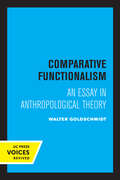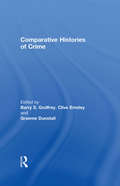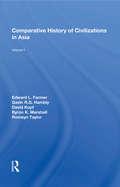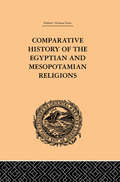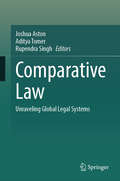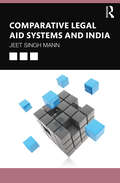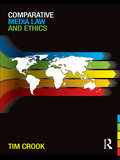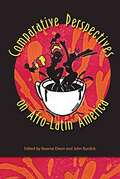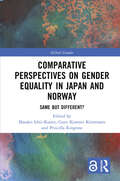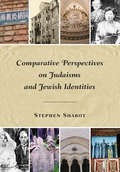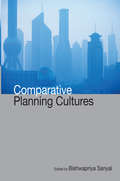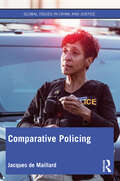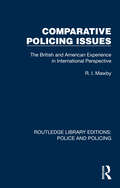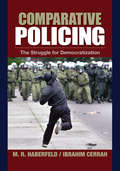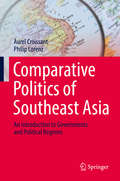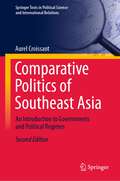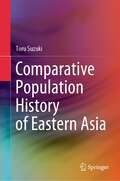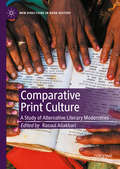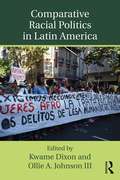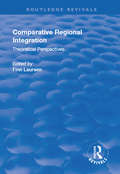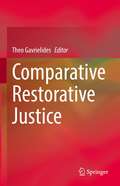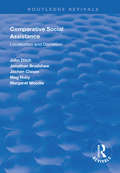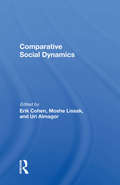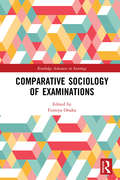- Table View
- List View
Comparative Functionalism: An Essay in Anthropological Theory
by Walter GoldschmidtThis title is part of UC Press's Voices Revived program, which commemorates University of California Press’s mission to seek out and cultivate the brightest minds and give them voice, reach, and impact. Drawing on a backlist dating to 1893, Voices Revived makes high-quality, peer-reviewed scholarship accessible once again using print-on-demand technology. This title was originally published in 1966.
Comparative Historical Analysis in the Social Sciences
by James Mahoney Dietrich RueschemeyerThis book systematically investigates the past accomplishments and future agendas of contemporary comparative-historical analysis. Its core essays explore three major issues: the accumulation of knowledge in the field over the past three decades, the analytic tools used to study temporal process and historical patterns, and the methodologies available for making inferences and for building theories. The introductory and concluding essays situate the field as a whole by comparing it to alternative approaches within the social sciences. Comparative Historical Analysis in the Social Sciences will serve as an invaluable resource for scholars in the field, and it will represent a challenge to many other social scientists - especially those who have raised skeptical concerns about comparative-historical analysis in the past.
Comparative Histories of Crime
by Barry Godfrey Graeme Dunstall Clive EmsleyThis book aims to both reflect and take forward current thinking on comparative and cross-national and cross-cultural aspects of the history of crime. Its content is wide-ranging: some chapters discuss the value of comparative approaches in aiding understanding of comparative history, and providing research directions for the future; others address substantive issues and topics that will be of interest to those with interests in both history and criminology. Overall the book aims to broaden the focus of the historical context of crime and policing to take fuller account of cross-national and cross-cultural factors.
Comparative History Of Civilizations In Asia: Volume 1
by Edward L. FarmerThis book gives an overview of all of Asian history from the eastern borders of Europe to the Pacific and from the birth of civilization to the present. It provides a broad framework and flexible method for thinking about the history of the people of Asia.
Comparative History of the Egyptian and Mesopotamian Religions: Vol I - History of the Egyptian Religion
by C.P. TieleFirst published in 2000. Routledge is an imprint of Taylor & Francis, an informa company.
Comparative Law: Unraveling Global Legal Systems
by Joshua Aston Aditya Tomer Rupendra SinghThis book, centered on the theme of Comparative Law, offers an unparalleled journey through various legal landscapes, aiming to enhance readers' comprehension by juxtaposing laws from diverse fields and countries. Encompassing areas such as constitutional law, transformative constitution, environmental law, family law, child rights, and artificial intelligence, the book invites readers to navigate the global legal tapestry. What sets this work apart is its meticulous approach, encouraging readers to draw comparisons, fostering a nuanced understanding of legal concepts. Beyond a mere exploration of legal systems, the book delves into the philosophies that underpin them, offering insights into cultural and historical influences. By showcasing best practices from different legal traditions, the book aspires to contribute to the advancement of humanity, promoting the adoption of progressive legal approaches worldwide. This is not just a book; it's a gateway to a world where legal traditions converge, providing readers with a profound and informed perspective on the multifaceted nature of law in our interconnected global society.
Comparative Legal Aid Systems and India
by Jeet Singh MannThis book provides an in-depth analysis of the functioning and challenges of the legal aid system in India. The legal aid system was set up to promote the interests of the economically weaker sections of society that did not have equitable access to judicial systems. However, the system has been largely unsuccessful in delivering justice. Drawing on empirical data from 18 states and 36 districts in India, the book highlights the institutional setbacks that plague the legal aid system and urges us to take cognizance of the hindrances faced by the beneficiaries in availing of these services. It acknowledges the gaps that exist in the governance of the legal aid system in India at the grassroots level and suggests approaches and ways to address these roadblocks to deliver free, swift, and economical access to justice to the poor legal aid beneficiaries. An important critical study of the commitment and competence of legal aid counsels in India, this volume will be an essential read for scholars and researchers of law, Indian law, constitutional law, political science, comparative law, law and gender, and social work.
Comparative Media Law and Ethics
by Tim CrookProviding practical and theoretical resources on media law and ethics for the United Kingdom and United States of America and referencing other legal jurisdictions such as France, Japan, India, China and Saudi Arabia, Comparative Media Law and Ethics is suitable for upper undergraduate and postgraduate study and for professionals in the media who need to work internationally. The book focuses on the law of the United Kingdom, the source of common law, which has dominated the English speaking world, and on the law of the USA, the most powerful cultural, economic, political and military power in the world. Media law and ethics have evolved differently in the US from the UK. This book investigates why this is the case. Throughout, media law and regulation is evaluated in terms of its social and cultural context.The book has a companion website at http://www.ma-radio.gold.ac.uk/cmle providing complementary resources and updated developments on the topics explored.
Comparative Perspectives on Afro-Latin America
by John Burdick Kwame DixonAs academic interest in Afro-Latin America increases, so, too, does the need for a fresh text detailing the cultural and political issues facing black populations throughout the region. With existing literature focused on populations in individual countries, editors Kwame Dixon and John Burdick have encouraged their contributors to move beyond borders in this wide-ranging study. Comparative Perspectives on Afro-Latin America offers a new, dynamic discussion of the experience of blackness and cultural difference, black political mobilization, and state responses to Afro-Latin activism throughout Latin America. Its thematic organization and holistic approach set it apart as the most comprehensive and up-to-date survey of these populations and the issues they face currently available.
Comparative Perspectives on Gender Equality in Japan and Norway: Same but Different? (Global Gender)
by Masako Ishii-KuntzThis book compares perspectives on gender equality in Norway and Japan, focusing on family, education, media, and sexuality and reproduction as seen through a gendered lens. What can we learn from a comparison between two countries who stand in significant contrast to each other with respect to gender equality? Norway and Japan differ in terms of historical, cultural and socioeconomic backgrounds. Most importantly, Japan lags far behind Norway when it comes to the World Economic Forum’s Gender Gap Report. Rather than taking a narrow approach that takes as its starting point the assumption that Norway has so much ‘more’ to offer in terms of gender equality, the authors attempt to show that a comparative perspective of two countries in the West and East can be of mutually benefit to both contexts in the advancement of gender equality. The interdisciplinary team of researchers contributing to this book cover a range of contemporary topics in gender equality, including fatherhood and masculinity, teaching and learning in gender studies education, cultural depictions of gender, trans experiences and feminism. This unique collection is suitable for researchers and students of gender studies, sociology, anthropology, Japan studies and European studies.
Comparative Perspectives on Judaisms and Jewish Identities
by Stephen SharotProvides sociological analyses of religious developments and identities in both historical and contemporary Jewish communities.
Comparative Planning Cultures
by Bishwapriya SanyalBringing together leading planning and urban scholars, and including fascinating international case studies, this unique book investigates urban planning across the world and in different cultures.
Comparative Policing (Global Issues in Crime and Justice)
by Jacques de MaillardThis book is a systematic and comparative analysis of police systems in the Western world, looking at their structure and how they tackle contemporary social problems, such as economic austerity, multi-level governance, transnational change, relations with minorities and transformation of delinquency. Core content includes: • Comparative histories of the formation of national police systems; • A discussion of centralised and decentralised police systems; • International differences in community policing; • A review of different police strategies in fighting delinquency and reducing urban disorder; • A comparative analysis of different ways of controlling police misconduct; • An exploration of different models of plural policing. While other books focus on policing in relation to measures effective in decreasing delinquency and augmenting security, this book considers the political, professional, administrative and political economic parameters which frame and shape the course of police reforms. It also explores how operational policing is shaped by the cultural and institutional contexts in which it is located. It is essential reading for students engaged in international police studies and comparative criminal justice.
Comparative Policing Issues: The British and American Experience in International Perspective (Routledge Library Editions: Police and Policing)
by R. I. MawbyOriginally published in 1990, Comparative Policing Issues was the first introductory text to consider key issues in the policing of modern societies from an international, comparative perspective. The author begins with a discussion of policing itself and considers how the modern police force has emerged. Separate sections then focus on France and the Netherlands as examples of Western European societies: Canada and Hong Kong as influenced by the colonial tradition; Japan as an Eastern capitalist society; and the USSR, China and Cuba as contrasting examples of communist police systems. These and other countries are then considered in terms of the relationship between the police and the communities they ‘serve’. Critical issues addressed include the following: Are communist and capitalist systems of policing significantly different? What lessons are to be learnt from Japan, with its low crime rate? How accountable are the police in different societies, and to whom? To what extent is the ‘character’ of the police in any society determined by the wider culture, and social and political structure of that society? How practicable is it to transfer ideas about policing from one society to another? The lowering of barriers within the European community and the return of Hong Kong to China are just two examples of the need for a comparative analysis of policing. Students of criminology and police studies, and police and others working in the criminal justice system will find this book an invaluable resource.
Comparative Policing: The Struggle for Democratization
by Dr Maria Maki Haberfeld Ibrahim Cerrah"A wonderful resource, user friendly and very well written." - Timothy J. Horohol, John Jay CollegeA unique approach to studying police forces around the globe How do police forces around the world move toward democratization of their operations and responses? Analyzing police forces from 12 different countries, Comparative Policing: The Struggle for Democratization assesses the stages of each country based on the author's development of a "Continuum of Democracy" scale. Key Features Using five basic themes, this book uses the following criteria to rank and evaluate where each country falls on the continuum, clarifying how policing practices differ: · History of a democratic form of government · Level of corruption within governmental organizations and the oversight mechanisms in place · Scope of and response to civil disobedience · Organization structures of police departments · Operational responses to terrorism and organized crime Intended Audience: This unique analysis of policing is an ideal text for undergraduate and graduate courses in Comparative Criminal Justice, Police Studies, Policing and Society, and Terrorism in departments of criminal justice, criminology, sociology, and government.
Comparative Politics of Southeast Asia: An Introduction to Governments and Political Regimes
by Aurel Croissant Philip LorenzThis textbook provides a comprehensive introduction to the political systems of all ASEAN countries and Timor-Leste from a comparative perspective. It investigates the political institutions, actors and processes in eleven states, covering democracies as well as autocratic regimes. Each country study includes an analysis of the current system of governance, the party and electoral system, and an assessment of the state, its legal system and administrative bodies. Students of political science and regional studies will also learn about processes of democratic transition and autocratic persistence, as well as how civil society and the media influence the political culture in each country.
Comparative Politics of Southeast Asia: An Introduction to Governments and Political Regimes (Springer Texts in Political Science and International Relations)
by Aurel CroissantThis textbook provides a comprehensive introduction to the political systems of all ASEAN countries and Timor-Leste from a comparative perspective. It investigates the political institutions, actors, and processes in eleven states, covering democracies as well as autocratic regimes. Each country study includes an analysis of the current system of governance, the party and electoral system, and an assessment of the state, its legal system, and administrative bodies. Students of political science and area studies also learn about processes of democratic transition and autocratic resilience, as well as how civil society and the media influence the political culture in each country. This second edition features revised and updated versions of all country studies and a new chapter that discusses the trends of democratization and autocratization in Southeast Asia in the late 20th and early 21st centuries.
Comparative Population History of Eastern Asia
by Toru SuzukiThis book compares the population history of Japan, Korea, Taiwan, and China to understand such emergent changes as extremely low fertility in Korea and Taiwan, compressed urbanization and a massive diaspora from Korea, early population aging relative to economic development in China, and changing patterns of cross-border migration in the region. After discussing the origin of each ethnic group, premodern population changes are examined by reviewing historical demographic studies including those written in local languages. A new population estimation for premodern Korea is also presented. Topics covered in this book include population growth, fertility, mortality, domestic and cross-border migration, marriage, divorce, and households. Contrasts between economic and population giants (China and Japan), former Japanese colonies (Korea and Taiwan), feudalism and Confucianism (Japan and others), and capitalism and socialism of the same ethnic groups (South and North Korea, Taiwan, and China) provide a fresh view of population dynamics in relation to political, economic, and cultural changes. The population study of Eastern Asia has great importance. If economic development is checked by early and rapid aging, it functions to preserve the conventional Euro-centric world system and Pax Americana. On the other hand, if China succeeds in further development while sustaining a socialist dictatorship, it is a challenge to the authority of liberal democracy. If the institution of marriage remains robust and extramarital births do not increase in Eastern Asia, it implies that an aspect of family change is culturally dependent. This book provides clues to help answer such important questions.
Comparative Print Culture: A Study of Alternative Literary Modernities (New Directions in Book History)
by Rasoul AliakbariDrawing on comparative literary studies, postcolonial book history, and multiple, literary, and alternative modernities, this collection approaches the study of alternative literary modernities from the perspective ofcomparative print culture. The term comparative print culture designates a wide range of scholarly practices that discover, examine, document, and/or historicize various printed materials and their reproduction, circulation, and uses across genres, languages, media, and technologies, all within a comparative orientation. This book explores alternative literary modernities mostly by highlighting the distinct ways in which literary and cultural print modernities outside Europe evince the repurposing of European systems and cultures of print and further deconstruct their perceived universality.
Comparative Racial Politics in Latin America
by Kwame Dixon Ollie A. Johnson IIILatin America has a rich and complex social history marked by slavery, colonialism, dictatorships, rebellions, social movements and revolutions. Comparative Racial Politics in Latin America explores the dynamic interplay between racial politics and hegemonic power in the region. It investigates the fluid intersection of social power and racial politics and their impact on the region’s histories, politics, identities and cultures. Organized thematically with in-depth country case studies and a historical overview of Afro-Latin politics, the volume provides a range of perspectives on Black politics and cutting-edge analyses of Afro-descendant peoples in the region. Regional coverage includes Argentina, Brazil, Colombia, Cuba, the Dominican Republic, Ecuador, Haiti and more. Topics discussed include Afro-Civil Society; antidiscrimination criminal law; legal sanctions; racial identity; racial inequality and labor markets; recent Black electoral participation; Black feminism thought and praxis; comparative Afro-women social movements; the intersection of gender, race and class, immigration and migration; and citizenship and the struggle for human rights. Recognized experts in different disciplinary fields address the depth and complexity of these issues. Comparative Racial Politics in Latin America contributes to and builds on the study of Black politics in Latin America.
Comparative Regional Integration: Theoretical Perspectives (New Regionalisms Ser.)
by Finn LaursenThis title was first published in 2003. After briefly reviewing the basic theoretical stances animating the rest of the proceedings, Laursen (international politics, U. of Southern Denmark) presents 11 contributions that comparatively review processes of regional integration around the world.
Comparative Restorative Justice
by Theo GavrielidesThis edited collection introduces and defines the concept of “comparative restorative justice”, putting it in the context of power relations and inequality. It aims to compare the implementation and theoretical development of restorative justice internationally for research, policy and practice. In Part I, this volume compares practices in relation to the implementing environment - be that cultural, political, or societal. Part II looks at obstacles and enablers in relation to the criminal justice system, and considers whether inquisitorial versus adversarial jurisdictions have impact on how restorative justice is regulated and implemented. Finally, Part III compares the reasons that drive governments, regional bodies, and practitioners to implement restorative justice, and whether these impetuses impact on ultimate delivery.Featuring fifteen original chapters from diverse authors and practitioners, this will serve as a key resource for those working in social justice or those seeking to understand and implement the tenets of restorative justice comparatively.
Comparative Social Assistance: Localisation and Discretion (Routledge Revivals)
by Jonathan Bradshaw John Ditch Jochen Clasen Meg Huby Margaret MoodiePublished in 1997, the is the report of a study commissioned by the Department of Social Security (UK). The aim of the study was to provide detailed information about the social assistance systems of four European countries which, to a greater or lesser extent, are delegated to local levels of government. The study distinguished between policy-making, finances, delivery and accountability. The strengths and weaknesses of each system were evaluated and common and divergent trends noted. There is growing interest in social assistance schemes internationally and this publication provides original information about European schemes. It follows an earlier study, also commissioned by the DSS, on social assistance schemes in 24 OECD countries.
Comparative Social Dynamics: Essays In Honor Of S. N. Eisenstadt
by Erik CohenThese original articles relate to major themes in the comparative study of the dynamics of cultures, modernization, and social and political change. The authors, ranking scholars in their fields, provide fresh and important insights to the study of topics such as the interface of anthropological and sociological theory, the dynamics of Latin Americ
Comparative Sociology of Examinations (Routledge Advances in Sociology)
by Fumiya OnakaContemporary societies are constructed, constricted, and constrained by various series of examinations. Governments of both Western and non-Western countries tend to conduct detailed, multi-layered and continuous systems of tests or examinations. International tests, such as PISA and TIMSS, have also been introduced to compare the relative performances of learners within diverse educational institutions across different countries. Examinations therefore provide a methodological pivot for comparing a range of societies. They enable us to contrast the West and the East; the North and the South; tribal and mass society; ancient and postmodern civilization; and so on. Comparing parallel societies from across Asia, the Middle East, Europe, and North America, this book proposes fundamental transitions in sociological research from system to process and from communication to composition through intensive studies on examinations. It uses ethnographies, interviews, questionnaires, documents, statistics, and big-data analyses to make comparisons on broad scales of time and space. In so doing, it suggests hypotheses encompassing different kinds of societies in human history, including those in the Axial Age and the Modern Ages.
